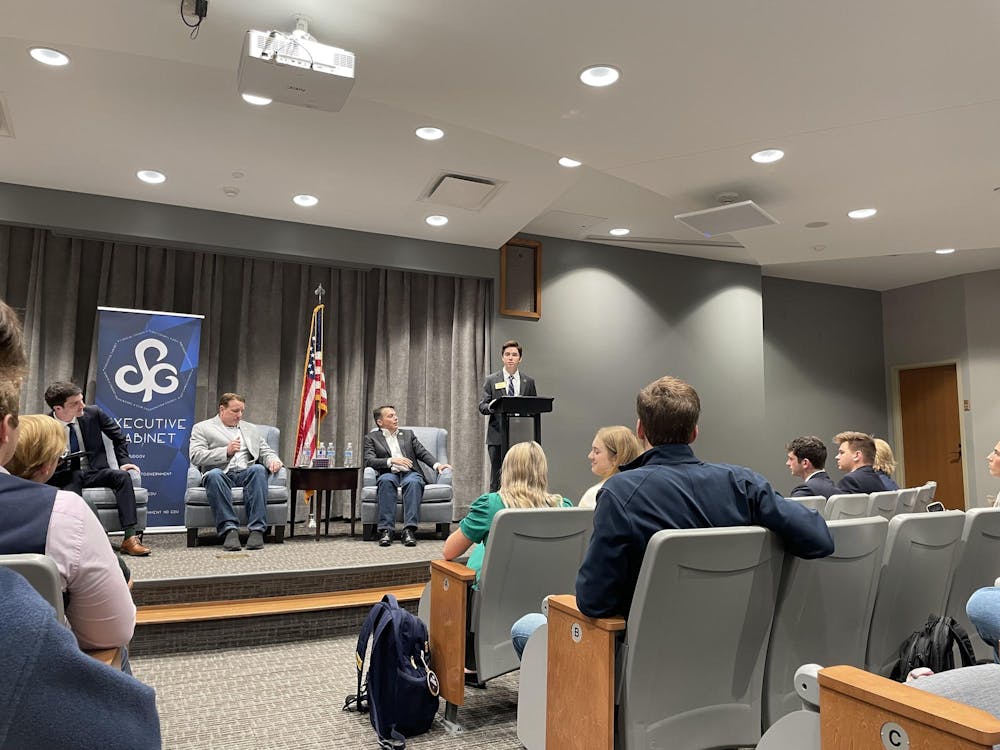Congressmen Brendan Boyle of Pennsylvania and Pat Fallon of Texas spoke in Geddes Hall Friday morning about bipartisanship in Congress in an event hosted by student government. Boyle, who graduated from Notre Dame in 1999 and Fallon, who graduated in 1990, were led in discussion by junior Jack Onderdonk, director of national affairs and political engagement for student government.
Seats in the Geddes Hall auditorium were mostly filled by members of student government, with roughly a dozen other students making the trek to the auditorium on their Friday mornings. Boyle and Fallon were introduced by student body president Dawson Kiser, who praised the pair for showing “the role each of us can play in fostering a more united society.”
Boyle and Fallon both reflected on the impact Notre Dame had on their personal lives and their political careers. Boyle said he was the first in his family to attend college and explained Notre Dame emphasized the values he had been taught by his family growing up.
“[Notre Dame was] a continuation of what I had been taught in terms of the value of public service, believing in this country, but also believing we have an obligation to give back,” he said.
Fallon recounted his experience as a transfer student living off-campus and said the experience taught him the importance of working hard and delaying gratification.
“It’s so hard to get into this university that you have to set goals, and you all have, if you’re here,” he said, imploring students to “continue to do that your entire life.”
Although political disagreement can be cumbersome when it comes to getting legislation passed, Fallon said it is worth the price of having “legitimacy” in government.
“For 9,000 years or so of human history, people were ruled by the warriors that had the most spears and the most accurate guns,” he said. “So we are the exception.”
Fallon stressed the need not to make every issue a partisan flashpoint.
“We have to change the culture of the chamber. At one point in time, it was far more functional and far more bipartisan, and it evolved for many reasons. Depending on who you talk to, there’s a finger point, but it’s devolved into a very bad and dark place right now, and we can get out of it,” he said. “It doesn't always have to be that way.”
Preventing this progress, both Fallon and Boyle said, are members of Congress who aim only to create controversy and advance their own political careers.
“The vast majority of members are doing it for the right reasons, and they’re very talented people on both sides,” Fallon said. “But there are some looney tunes that are in it for themselves.”
Fallon said working across the aisle can be necessary in order to prevent these members of Congress from having a “veto” on legislation.
Boyle stressed the importance of having strong leadership in times of slim majorities in order to get legislation passed, and he praised former Speaker of the House Nancy Pelosi for accomplishing this.
“If you have a small majority, the lesson to be learned is you need a lot of party discipline,” he said.
Fallon echoed Boyle’s praise of the effectiveness of Pelosi’s speakership. “You have to tip your cap,” he said.
One issue that both Fallon and Boyle said needs bipartisan support is addressing the potential financial insolvency of social security in the next decade. The Treasury estimates that social security will be bankrupt by 2035.
Fallon clashed with Boyle, however, on what Democrat plans to address social security insolvency might entail, with Fallon suggesting restructuring how the program works, including potentially raising the retirement age, and Boyle suggesting raising government revenue and keeping the program the same.
“When you say increasing revenue, that means increasing taxes,” Fallon quipped. “That’s a good way to market it.”
Ultimately, the pair agreed that a compromise solution would have to be found and stressed the need to address the problem sooner rather than later.
Reflecting on increased polarization in Congress, Boyle lamented the fact that parties have become increasingly ideologically pure.
“We have over this generation, purified both parties … and I think that that has actually been bad for the parties. I think it has made it more difficult in Congress. And I think part of the divisions we have in society is the fact that we have, instead of two heterodox major parties, we have two ideologically pure ones,” Boyle said.
Despite their disagreements, Boyle and Fallon highlighted the importance of fostering personal relationships, such as theirs, to getting things done in Congress. Fallon emphasized with Congress being so large, it is impossible to get anything passed without working with others.
“Relationships are everything,” Boyle said. “And the kind of people who don’t make it, or aren’t very effective serving in the house, frankly, are people who didn’t learn the lessons in kindergarten, basically how to play nice with others.”
Both Boyle and Fallon expressed their hope that Notre Dame students will get involved in politics and value bipartisanship.
“What the interesting and exciting thing for me is, not only are there people in this room that are considering running for office, but that will, but will also win and will serve and we might be serving with you in Congress some day,” Fallon said.










